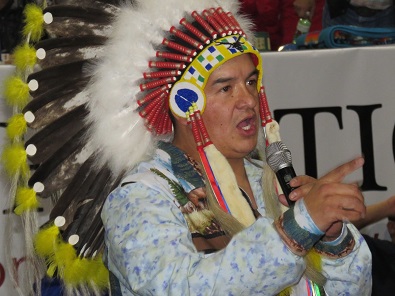The Federation of Sovereign Indigenous Nations says it is in discussions with several Saskatchewan First Nations on legal options to put a stop to the auction sale of Crown land.
FSIN Chief Bobby Cameron has sent a letter to the ministers of Agriculture, First Nations Affairs and Environment outlining the FSIN’s position that no Crown land should be eligible for sale while there are outstanding land claims and landless First Nations in the midst of negotiating their land base.
Cameron says the Treaty Land Entitlement and Specific Claims First Nations were never allowed to participate in any of these land sale programs, despite the legal obligation the provincial government has toward the First Nations in Treaty Land Entitlement settlement agreements and section 10 of the Natural Resource Transfer Agreement, which states that Saskatchewan has legal obligations to Canada to provide unoccupied Crown lands for the creation of Indian reserves.
“In every instance, the provincial government has failed to consult and accommodate the TLE and Specific Claims First Nations of each new land sale program and policy change,” Cameron says in a release. “And they have regularly been disallowed from participating in these land sales.”
The provincial government has legal obligations to First Nations with outstanding land entitlement which it must live up to,” says FSIN Vice-Chief Dutch Lerat. “The implementation of these TLE settlement agreements is critical to the economic success of those First Nations.”
“We can no longer sit idly by while the provincial government disrespects our Treaty rights,” says Cameron. “If they are not willing to work with us on a political solution, then we will see them in court.”
The federation says the Ministry of Agriculture is planning on selling 62 parcels of Crown land to the highest bidder through Ritchie Brothers Auctioneers of Edmonton, which the FSIN says it only recently found out about through social media.
The provincial government says it has not breached any agreements with First Nations in the province when it comes to its auction of vacant Crown lands.
Wally Hoehn is the executive director for the Ministry of Agriculture and says the government process for following the duty to consult with First Nations has not changed with the land auction.
“And through that process, there were five parcels that a First Nation and a Metis community had identified as having an interest in,” Hoehn says. “And we aren’t advertising those. We are working with both groups to understand what their use of that land is.”
Hoehn says the only difference from previous land sales to this one is the use of an auction house for the process.
He adds a formal response to the letter from the FSIN has not yet been discussed by the three government ministries in question.
